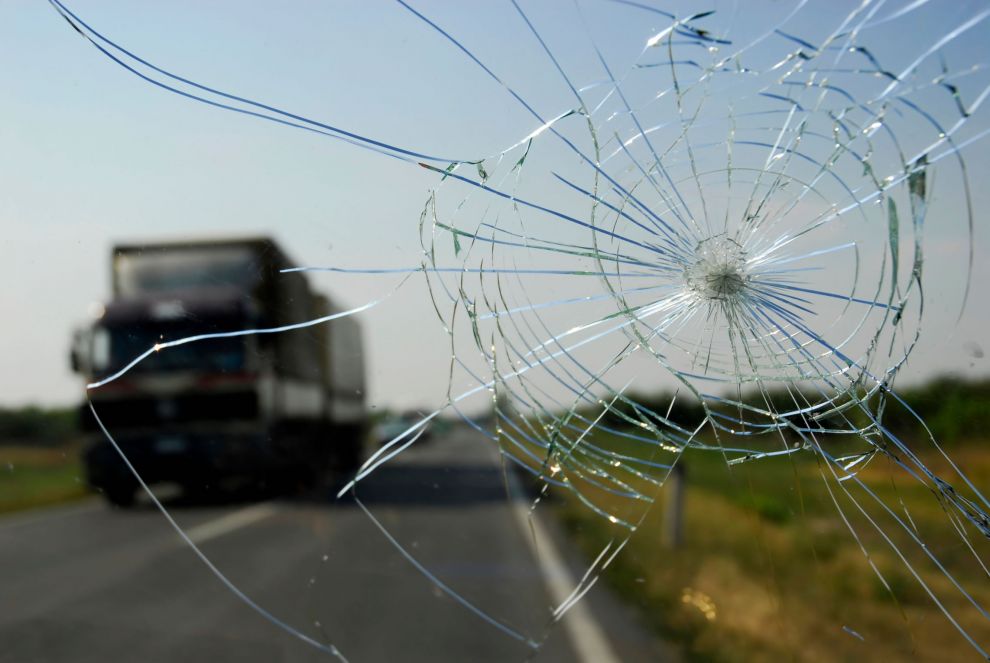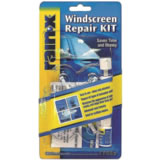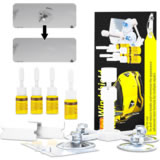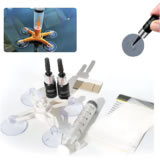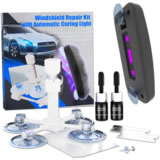Georgia Cracked Windshield Laws
All states have different laws regarding cracked windshields. A damaged windshield on your car can lead to all kinds of hazardous situations, but Georgia traffic laws do allow driving with a damaged windshield under certain circumstances.
Let’s take a closer look at cracked windshield laws in Georgia and see if your damaged windshield makes your vehicle unsafe to drive.
Is driving with a cracked windshield legal in Georgia?
Georgia laws prohibit driving with a cracked windshield or rear window, where the crack is over 3 inches by 3 inches in size.
Excerpt from Georgia Code: § 40-8-73:
(e) No motor vehicle shall be operated with a windshield or rear window having a starburst or spider webbing effect greater than three inches by three inches.
Additionally GA laws also have provisions against obstructed views. You are not permitted to apply window stickers, advertisements, or other objects which may prevent clear view of the road. In case the windshield crack is in your line of sight, it can be considered as obstructing or distracting and you can receive a fine.
Laws also require your windshield wipers to be in good working order, so any crack which can is in their operating radius can potentially interfere with proper operation of the wipers, and can therefore be considered illegal. Any cracks which may cause the glass to change shape by becoming convex or concave can result in a vehicle equipment violation ticket.
Federal regulations
U.S. federal regulations also state that any cracks or chips smaller than ¾ of an inch in diameter are permitted, as long as they are not located within 3″ of another crack. These cracks however must not be located directly in front of the driver’s view (top of steering wheel to within top edge of windshield).
It’s often up to each police officer’s discretion whether you’ll be issued a citation or not. Unless the crack is in a corner and preferably on passengers side, it’s possible you will have to pay a fine, and be ordered to replace or repair your windshield or other cracked windows.
Sources and references:
- Georgia Code § 40-8-73, Title 40 (Motor Vehicles and Traffic), Chapter 8 (Equipment and Inspection of Motor Vehicles), Article 1 (Equipment Generally), Part 4 (Horns, Exhaust Systems, Mirrors, Windshields, etc.)
Can a damaged windshield be repaired?
To repair or replace your windshield is a question all drivers with damaged windshields have. Depending on the extent of the damage on your car’s windshield, you may be able to repair it, but otherwise it may need to be completely replaced.
You should be able to repair your windshield in case the crack on it is less than 3″ in length, or if you have a small chip which is smaller than the size of a quarter. Repairing these small cracks always costs less compared to a full replacement.
Your insurance company may even cover your repair bill if you have comprehensive car insurance, though you should consult with them first to see if they do. Comprehensive insurance in Georgia is not mandatory so check with your insurance company first! Decision whether to repair or replace your cracked window is usually up to the insurance company.
If your windshield is cracked directly in front of the driver’s line of sight some shops may decline repairing it, since even then it can obstruct your vision and cause safety concerns. If your windshield is too damaged you may have to replace it completely, which can cost a few hundred dollars.
Penalties
There are no specified penalties for having a cracked window in Georgia. If a police officer issues a ticket, you will generally have to pay a fine and fix any cracked car window. Fines can be different in each city or county.
Cracked windshield safety concerns
Impaired vision is not the only reason why you should repair or replace your broken or damaged car windshield. An undamaged windshield is stronger and in case of accidents can prevent further injuries.
The strength of the windshield/sealant system is designed to keep the roof from crushing in case of a rollover accident. In a front end collision at approximately 30mph, the windshield/sealant system is designed to keep at least 50% of the glass sealed to the car which can also keep occupants from being ejected.
While you can drive with a cracked windshield and may avoid a ticket from police, it’s certainly not advisable. Driving with a cracked windshield can be dangerous and potentially against the law.
